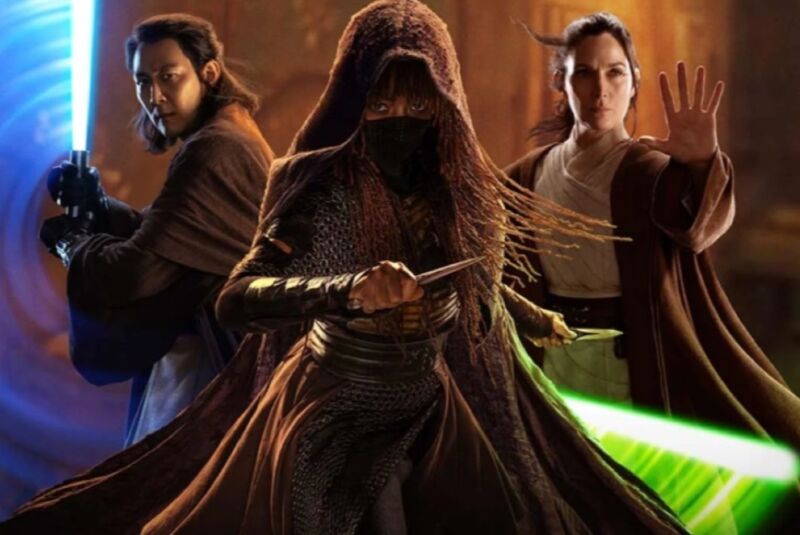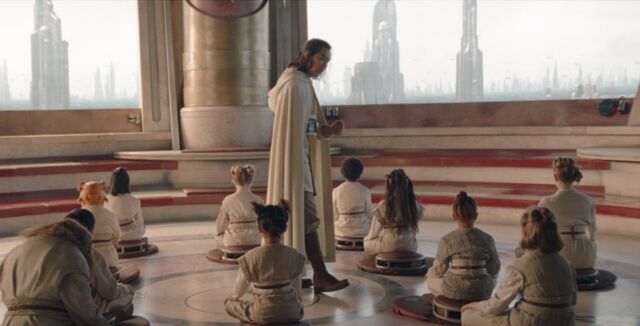
Disney+
The Star Wars franchise is creeping up on the 50-year mark for the original 1977 film that started it all, and Disney+ has successfully kept things fresh with its line of live-action Star Wars spinoff series. The Mandalorian and Andor were both unquestionably popular and critical successes, while The Book of Boba Fett ultimately proved disappointing, focusing less on our favorite bounty hunter and more on setting up the third season of The Mandalorian. Obi-Wan Kenobi and Ahsoka fell somewhere in between, bolstered by strong performances from its leads but often criticized for sluggish pacing.
It’s unclear where the latest addition to the TV franchise, The Acolyte, will ultimately fall, but the first five episodes aired thus far bode well for its place in the growing canon. The series eschews the usual Star Wars space-battle fare for a quieter, space Western detective story—who is killing the great Jedi masters of the galaxy?—with highly choreographed fight scenes that draw heavily from the martial arts. And like its predecessors, The Acolyte is recognizably Star Wars. Yet it also boasts a unique aesthetic style that is very much its own.
(Spoilers below for episodes 1 through 5 of The Acolyte.)
A long time ago, in a galaxy far, far away, the Galactic Republic and its Jedi masters symbolized the epitome of enlightenment and peace. Then came the inevitable downfall and outbreak of war as the Sith, who embraced the Dark Side of the Force, came to power. The Acolyte explores those final days of the Republic as the seeds of its destruction were sown.
The eight-episode series was created by Leslye Headland. It’s set at the end of the High Republic Era, about a century before the events of The Phantom Menace. Apparently, Headland rather cheekily pitched The Acolyte as “Frozen meets Kill Bill.” She drew on wuxia martial arts films for inspiration, much like George Lucas was originally inspired by Westerns and the samurai films of Akira Kurosawa. In this period, the Jedi aren’t the underdog rebels battling the evil Galactic Empire. They are at the height of their power and represent the dominant mainstream institution—presumably benevolent, but that might depend on one’s perspective. Headland particularly wanted to explore the question of how Darth Sidious managed to come to power and infiltrate the Galactic Senate without the Jedi ever suspecting it.
The Acolyte opens on the planet Ueda, where a mysterious masked woman wielding daggers attacks the Jedi Master Indara (Carrie Ann Moss) and kills her. (This was an utter waste of a gifted “name” actor, but it certainly set the stakes early.) The assassin is quickly identified as Osha Aniseya (Amandla Stenberg), a former padawan now working as a meknek, making repairs on spaceships.
Osha is arrested by her former classmate, Yord Fandar (Charlie Barnett), but claims she is innocent. She has a vision about her twin sister, Mae, who died in a fire on their home planet of Brendok when they were both quite young. She concludes that Mae is still alive and is the one who killed Indara. Osha’s former Jedi master, Sol (Lee Jung-jae), believes her. This is confirmed when we see Mae meeting with her mysterious Master, who wields a red lightsaber and commands her to kill a Jedi without using a weapon.
We eventually learn that Mae’s targets are not random. She is out to kill the four Jedi she blames for the fire on Brendok: Indara, Sol, Torbin (Dean-Charles Chapman), and a Jedi Wookiee named Kelnacca (Joonas Suotamo). The quartet had arrived on Brendok to demand they be allowed to test the twins as potential Jedi. The twins had been raised by a coven of “Force witches” there, led by Mother Aniseya (Jodie Turner-Smith), who believed the Jedi were misusing the Force. While Mae was keen to follow in their mother’s footsteps, Osha wanted to train with the Jedi. When the fire broke out, both Mae and Osha believed the other twin had been killed along with the rest of the coven. How the fire really started, and the identity of Mae’s Master, are the primary mysteries yet to be revealed.

Lucasfilm/Disney+
Star Wars has always had a distinctive style and visual language. The Acolyte sports something of the sleek look of an advanced civilization characteristic of the prequel trilogy, with just enough of a lived-in look to ensure it still feels like Star Wars—before the inevitable decay in the wake of the Republic’s collapse and establishment of the Empire. Production designer Kevin Jenkins and cinematographer Chris Teague played key roles in making sure The Acolyte stayed true to that ethos while also giving the series its own distinctive look.
Ars spoke with Teague and Jenkins to learn more.






















+ There are no comments
Add yours